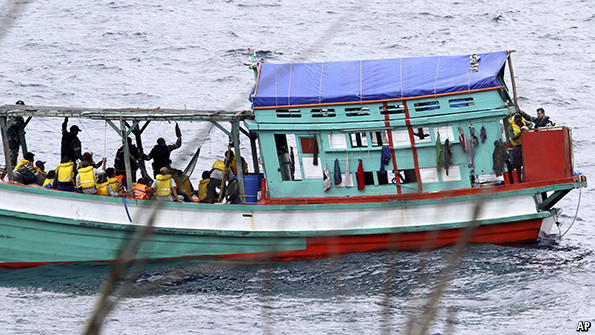A Cambodian solution

ON AUGUST 19th Australia’s government announced that it would
grant temporary visas to more than 1,500 asylum-seekers in detention,
all of them children. Advocates for the refugees welcomed the news. The
immigration ministry however is not about to soften the conservative
government’s hard-line policy towards asylum-seekers who are still
trying to reach Australia by boat. Tony Abbott, the prime minister, won
office after making a promise to “stop the boats” 11 months ago. Now his
government seems close to clinching a deal that would allow Australia
to transfer its “boat people” from one of its offshore detention
centres—to Cambodia.
Human-rights advocates, together with opposition politicians in both Australia and Cambodia, have slammed this plan. Bruce Haigh, a former Australian diplomat and a former member of the country’s refugee review tribunal, says it would amount to human trafficking.
For four months now there have been reports about
discussions between Australian and Cambodian officials. But Mr Abbott's
government has kept the Cambodia plan shrouded in secrecy, as it has
much of its work to “stop the boats”. Scott Morrison, the immigration
minister, has only confirmed that negotiations were still happening this week.
Other
reports suggest that Australia wants Cambodia to take about 1,000 of
the asylum-seekers it has detained in a camp on Nauru, a tiny
Pacific-island state. Nauru had agreed only to process boat people who
Australia sends there, not to resettle them. Australia would pay
Cambodia about 40m Australian dollars ($37m) in aid to take in its boat
people on a permanent basis. (Australia has an arrangement to operate a
separate camp for asylum-seekers on Manus Island, in Papua New Guinea.
The boat people there who succeed in claiming refugee status are
supposed to be resettled in PNG.)
The government’s choice of
Cambodia for any new deal leaves many people dumbfounded. Australia’s
wealth and political stability make for an awful contrast with
Cambodia’s poverty and corruption. Australia might not be able to
guarantee the safety of any asylum-seekers who were transferred to
Cambodia. Paul Power, head of an NGO called the Refugee Council of
Australia, is worried about Cambodia’s “history of human-rights violations and its track record of expelling refugees back to danger”.
He has in mind Cambodia’s practice of returning Montagnard refugees to
Vietnam, and Uighur asylum-seekers to China; in both cases, the ethnic
minorities have faced persecution in the countries they had fled.
Phil Robertson, of Human Rights Watch, goes further. He calls the proposed plan with Cambodia a “refugee-dumping deal”,
in which Australia would be trying to outsource its obligations under
the UN refugee convention. Mr Robertson argues that Mr Abbott and his
government “should be universally condemned for his central role in
trashing the principle of refugee protection in the region”.
Mr
Morrison seems unmoved. He says a deal would "build the capability for
people to be responsibly resettled in Cambodia”. Mr Morrison prides
himself on having delivered on Mr Abbott's “stop the boats” promise. The
government has used the navy to push vessels back to Indonesia, where
most of them embark for Australian territory. It recently marked six
months without any such boats having reached Australia. One contingent
of 157 Sri Lankan asylum-seekers, who had left from India, almost made it in late June, but Australian authorities intercepted their craft and diverted them to Nauru.
The
government justifies its policy in the name of deterring would-be
refugees from making dangerous boat journeys. Some see a more populist
angle: it plays well with some segments of Australian society to be seen
taking a tough line on unauthorised immigrants.
As far as public
theatre is concerned, Mr Morrison’s announcement on the child detainees
is a safe one. All the children involved in Mr Morrison’s planned
release are younger than 10 years old, and already living on the
Australian mainland. He has referred to 1,547 children as living in
“community detention”; about 150 more are being held in detention
centres. The whole group is to be released into the wider community on
temporary visas, along with their families.
Almost 500 more
children are being held on Nauru and in another detention centre on
Christmas Island, an Australian territory in the Indian Ocean. They are
to remain locked up while their refugee claims drag on. Mr Morrison
argued that keeping people in offshore centres is “what’s stopping the
children coming on the boats”.
Australia’s human-rights commission
is holding an inquiry into asylum-seeking children being held in
detention centres. Mr Morrison is due to give evidence on August 22nd.
Gillian Triggs, the commission’s head, recently returned from a visit to
Christmas Island, and spoke scathingly
about the impact of incarceration on the mental health of children
there. She wants all children released, whatever their age and location;
she says Mr Morrison’s announcement, goes only "some way" on this.


No comments:
Post a Comment